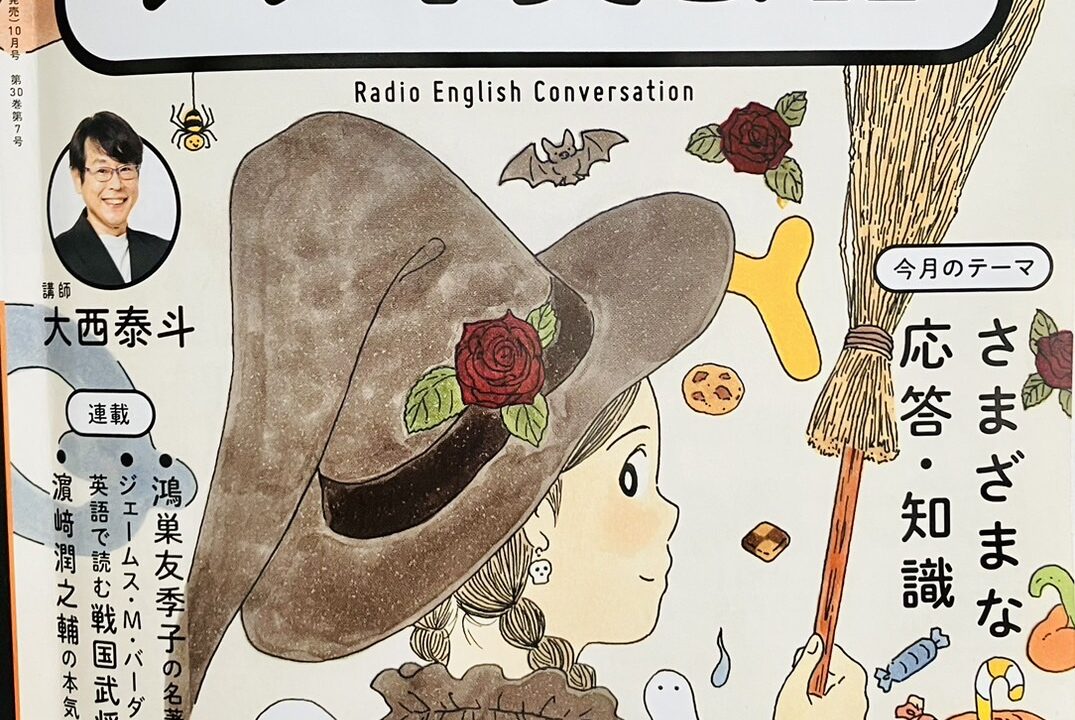October 19 Thursday, 2023
Lesson 134 発言タイプ:好意的な発言への応答②感謝を示しながら辞退する
★Opening
R: Sensei, you should get a part-time job.
O: Why is that?
R: Your career as a comedian is not working out.
D: And I’m Dad Evans. Ah, David Evans. Let’s get to it.
☆Words & Phrases
How‘s college life?
**pay for ~:
But this time I’ll pay for the plane ticket.
**That’s why ~:
That’s why I want to get a part-time job.
Why don’t you teach English conversation?
**shy:
No, I’m too shy.

☆Grammar and Vocabulary
① You can stay at your grandparents’ again.
at のイメージ
英単語は基本的なものであればあるほど、日本語訳を覚えるだけでは使いこなすことが難しくなる。日本語訳で使いづらい単語は、イメージ(単語の中核となる意味・ニュアンス)でとらえるようにする。
ここで使われた前置詞 at は「点」がイメージ。

at your grandparents’ は「祖父母のいるところ」という 「地点」を表している。
では次の例はどうでしょう。
I’m bad at teaching.
この場合も at は「点」。この文は「teaching という点では bad だ」と述べている。
② I think you’d make a good teacher.
make のイメージ
make は「(力を込めて)作り上げる」というイメージを持つ動詞。ここでは「~になる」という意味で使われているが、イメージは同じ。
you の素質や性格が a good teacher を「作り上げる」という意味。

イメージをつかめば、 英語は一段と学習しやすくなります。
友だち追加でLINEにラジオ英会話で学んだフレーズを実際のビジネスシーンで使うための方法、そして放送のまとめが届きます。
☆Typical Expressions
I appreciate your advice, but it’s not for me.
相手の好意的な申し出に応じることができない – そのような場合は、相手の好意を無にしないための配慮が必要。まずは「感謝」しているところがポイント。
使われる表現は場面によっていろいろだが、好意への配慮・感謝を心がければいい応答ができるでしょう。
【相手の提案に対して】
How about you stay at my place?
Thank you, but I don’t want to impose on you.
→ 感謝から辞退への流れ
How about you rent a car?
That’s a good suggestion, but I actually don’t have a license.
→ 提案の評価から辞退への流れ
【食べ物をすすめられて】
Would you like some quiche?
No, thank you. I’m already full, I’m afraid.
No, thank you. I would, but I’m afraid I just ate.
→ No, thank you. は「感謝」を含む、申し出を断る定番表現。でも大切なことは、その後に相手が納得できるひと言を添えること!
【誘われて】
Why don’t you join us?
Thanks for asking, but I have plans this evening. Maybe next time?
→ 誘ってくれたことにまず感謝。 辞退理由も添えること
【助力の申し出を受けて】
I’m happy to lend you a hand.
I appreciate the offer, but I’d like to handle this myself.
It’s kind of you to offer, but I’d like to handle this myself.
→ 辞退する前に念入りに感謝し、相手に配慮している
★Practice
R: Okay guys. It’s time to practice. Today, I want you to focus on the flow, and really just enjoy practicing.
D: That’s really good advice, Roza. We don’t say it enough, but we really do want to enjoy the practice. So, let’s jump right in.
R: This time again, we’re only going to be practicing the answers, not the questions.
D: Here’s our first,
– Thank you, but I don’t want to impose on you.
– That’s a good suggestion, but I actually don’t have a license.
R: Let’s continue,
– No, thank you. I’m already full, I’m afraid.
– No thank you. I would, but I’m afraid I just ate.
D: Good work so far. Let’s continue,
– Thanks for asking, but I have plans this evening. Maybe next time?
R: When you refuse an invite, it’s a good idea to add an alternative date
like here, “Maybe next time?” And our last example,
– I appreciate the offer, but I’d like to handle this myself.
And one more,
– It’s kind of you to offer, but I’d like to handle this myself.
D: These are so much better than just saying no. Don’t you think so?
R: Yeah, great point David. You guys did fantastic!
D: Really good work today.
☆Typical Expressions in Action
How about you buy a new TV?
と言われて
①悪いアイデアではありませんが、今はできません。そのお金がないのです。
Care to try some inago?
と言われて
②あ、いえ結構です。それは絶対おいしいのでしょうが、私には向いていません。
Why don’t talk to your boss for you?
と言われて
③お申し出感謝いたします。ご親切に、でもこれは彼女と私の問題ですから。
★Ending
O: “Thanks for asking, but I have plans this evening.”
D: I don’t recall inviting you ….
O: “Thanks for asking, but I have plans this evening.”
D: Ah~, he’s practicing again, isn’t he, Roza?
R: Sensei, why do you need to practice for a situation that will never happen?
October 19 Thursday, 2023
Lesson 134 発言タイプ:好意的な発言への応答②感謝を示しながら辞退する
(日本語訳・解説付き)
★Opening
R: Sensei, you should get a part-time job.
O: Why is that?
R: Your career as a comedian is not working out.
D: And I’m Dad Evans. Ah, David Evans. Let’s get to it.
※ Dad Evans は「エバンス親父、もしくは、エバンス神父」でしょうか?
☆Words & Phrases
How‘s college life?
大学生活の調子はどうですか?
※ How ~ はこの文では「様子=大学生活の様子」を尋ねていますね!
**pay for ~: ~(に向けて)の支払いをする
But this time I’ll pay for the plane ticket.
しかし今度は、飛行機のチケット代は自分で支払いをします。
**That’s why ~: だから~、それは~の理由だ
That’s why I want to get a part-time job.
だからアルバイトをしたいです。
※「アルバイト」は英語で part-time job です
Why don’t you teach English conversation?
英会話を教えるのはどうですか?
※ Why don’t you ~? は「~してはどうですか?」という軽い提案を表すフレーズです
**shy: 内気な
No, I’m too shy.
いいえ、私はとても内気な性格です。

☆Grammar and Vocabulary
① You can stay at your grandparents’ again.
あなたはまた、おじいさんとおばあさんのところに滞在することができます。
at のイメージ
英単語は基本的なものであればあるほど、日本語訳を覚えるだけでは使いこなすことが難しくなる。日本語訳で使いづらい単語は、イメージ(単語の中核となる意味・ニュアンス)でとらえるようにする。
ここで使われた前置詞 at は「点」がイメージ。

at your grandparents’ は「祖父母のいるところ」という 「地点」を表している。
では次の例はどうでしょう。
I’m bad at teaching.
私は教えるのが苦手です。
この場合も at は「点」。この文は「teaching という点では bad だ」と述べている。
② I think you’d make a good teacher.
あなたならいい先生になれるのではと思います。
make のイメージ
make は「(力を込めて)作り上げる」というイメージを持つ動詞。ここでは「~になる」という意味で使われているが、イメージは同じ。
you の素質や性格が a good teacher を「作り上げる」という意味。

イメージをつかめば、 英語は一段と学習しやすくなります。
友だち追加でLINEにラジオ英会話で学んだフレーズを実際のビジネスシーンで使うための方法、そして放送のまとめが届きます。
☆Typical Expressions
I appreciate your advice, but it’s not for me.
あなたのアドバイスには感謝しますが、それは私には向いていません。
相手の好意的な申し出に応じることができない – そのような場合は、相手の好意を無にしないための配慮が必要。まずは「感謝」しているところがポイント。
使われる表現は場面によっていろいろだが、好意への配慮・感謝を心がければいい応答ができるでしょう。
【相手の提案に対して】
How about you stay at my place?
私のところに泊まるのはどう?
Thank you, but I don’t want to impose on you.
ありがとう、でもご迷惑をおかけしたくないのです。
→ 感謝から辞退への流れ
How about you rent a car?
車を借りるのはどう?
That’s a good suggestion, but I actually don’t have a license.
いい提案ですね、でも実は免許を持っていないのです。
→ 提案の評価から辞退への流れ
【食べ物をすすめられて】
Would you like some quiche?
キッシュはいかが?
No, thank you. I’m already full, I’m afraid.
結構です。残念ながら、もうおなかいっぱいなのです。
No, thank you. I would, but I’m afraid I just ate.
いえ、結構です。食べたいのですが、残念ながら、食事をしたばかりなんです。
→ No, thank you. は「感謝」を含む、申し出を断る定番表現。でも大切なことは、その後に相手が納得できるひと言を添えること!
【誘われて】
Why don’t you join us?
一緒に来ませんか?
Thanks for asking, but I have plans this evening. Maybe next time?
誘ってくれてありがとう、でも今晩は予定があるのです。また次の機会にね?
→ 誘ってくれたことにまず感謝。 辞退理由も添えること
【助力の申し出を受けて】
I’m happy to lend you a hand.
喜んでお手伝いしますよ。
I appreciate the offer, but I’d like to handle this myself.
お申し出に感謝します、ですが自分でやってみたいのです。
It’s kind of you to offer, but I’d like to handle this myself.
ご親切なご提案ですが、自分でやってみたいのです。
→ 辞退する前に念入りに感謝し、相手に配慮している
★Practice
R: Okay guys. It’s time to practice. Today, I want you to focus on the flow, and really just enjoy practicing.
D: That’s really good advice, Roza. We don’t say it enough, but we really do want to enjoy the practice. So, let’s jump right in.
R: This time again, we’re only going to be practicing the answers, not the questions.
D: Here’s our first,
– Thank you, but I don’t want to impose on you.
– That’s a good suggestion, but I actually don’t have a license.
R: Let’s continue,
– No, thank you. I’m already full, I’m afraid.
– No thank you. I would, but I’m afraid I just ate.
D: Good work so far. Let’s continue,
– Thanks for asking, but I have plans this evening. Maybe next time?
R: When you refuse an invite, it’s a good idea to add an alternative date
like here, “Maybe next time?” And our last example,
– I appreciate the offer, but I’d like to handle this myself.
And one more,
– It’s kind of you to offer, but I’d like to handle this myself.
D: These are so much better than just saying no. Don’t you think so?
R: Yeah, great point David. You guys did fantastic!
D: Really good work today.
☆Typical Expressions in Action
How about you buy a new TV?
(新しいテレビを買ったら?)と言われて
①悪いアイデアではありませんが、今はできません。そのお金がないのです。
That’s not a bad idea, but I can’t right now. I don’t have the money.
Care to try some inago?
(イナゴはいかが?)と言われて
②あ、いえ結構です。それは絶対おいしいのでしょうが、私には向いていません。
Oh, no, thank you. I’m sure it’s delicious, but it’s not for me.
Why don’t talk to your boss for you?
(君の上司と話をしてあげようか?)と言われて
③お申し出感謝いたします。ご親切に、でもこれは彼女と私の問題ですから。
Thank you for offering. That’s kind of you, but this is between her and me.
★Ending
O: “Thanks for asking, but I have plans this evening.”
D: I don’t recall inviting you ….
O: “Thanks for asking, but I have plans this evening.”
D: Ah~, he’s practicing again, isn’t he, Roza?
R: Sensei, why do you need to practice for a situation that will never happen?
名古屋駅前にあるビジネス英語&仕事での英語雑談力をつけるための「名古屋BEGビジネス英会話ジム」
営業時間:平日 9:00~22:00 土曜日 9:00~19:00(日祝休み)
〒450-0002 愛知県名古屋市中村区名駅2丁目40-16 名駅野村ビル 5階




